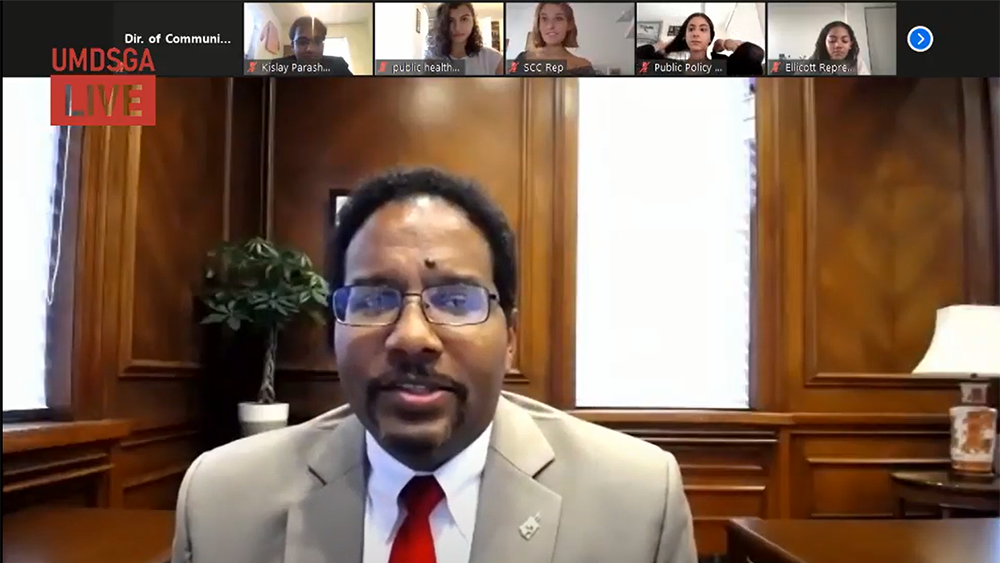University of Maryland President Darryll Pines joined Wednesday evening’s SGA meeting to answer questions about coronavirus safety measures, mental health and social justice on the campus.
Pines went over the university’s summer decision-making about reopening the campus, emphasizing the focus on mandatory testing for students before and after they arrived on the campus. Along with an 80 percent compliance from students on pre-arrival tests, the university has seen some of the lowest total numbers of positive cases among Big Ten universities.
“You guys, students, have played an enormous role in following these healthy behaviors,” Pines said. “That’s every person.”
Pines also defended the university’s decision to move forward with blended learning on Sept. 14, citing sympathy for new freshmen, whom he said have had “a terrible senior year.” Freshmen, who constitute the majority of undergraduates living in university-owned housing, are a priority for the administration when providing on-campus activities and social engagement, Pines said.
Josh Steighner, a computer, mathematical and natural sciences representative, was concerned with the safety of staff and the negotiations between the university and the union American Federation of State, County and Municipal Employees Local 1072.
“There’s no way I don’t care about these issues,” Pines said, mentioning he is the son of two union employees. Pines also cited his meetings with union leaders and work over the summer to provide housekeeping staff in residential facilities “cooling solutions” after the air conditioning was shut off in dorms where they worked.
[UMD SGA postpones annual safety walk due to COVID-19 concerns]
“[The university has] met literally multiple times a week since COVID has come here,” he said. “We are absolutely interested in making sure they are comfortable and safe.”
In July, Pines released a list of 12 initiatives for improving the student experience, one of which was staffing increases for mental health services. Pines said, however, that he’s waiting on a proposal from Georgina Dodge, vice president of diversity and inclusion, and Patty Perillo, vice president of student affairs, to address this, which he expects to get in the first week of October.
Claire Niggel, a behavioral and social sciences representative, called current mental health resources on campus, including the Counseling Center, a “bit of a shortcoming.”
Pines said Niggel was “dead right,” but that even as the hiring plan moves forward in October, the university is unlikely to bring in any new staff in place until spring.
“Both of these pandemics have a severe impact on mental health,” Niggel said, referring to the coronavirus and the effects of racism. “Mental health resources are critical right now.”
Those effects of racism were also a concern for Bella Simon, the education college’s representative, who asked Pines for an update about a memorial for 1st Lt. Richard Collins. Collins was murdered by a former student, Sean Urbanski, near a bus stop on the campus in 2017. The university has not yet created a permanent memorial on campus for the Black Bowie State student.
[Pines talks social injustice, COVID-19 in State of the Campus address to UMD Senate]
Simon said a memorial would help Black students feel seen and heard by the university.
“A lot of minority students are having trouble feeling like they have a safe place on campus,” Simon said. “Historically, UMD hasn’t been a very inclusive place.”
Pines said he will be announcing an update about the memorial for Collins in the coming weeks, mentioning that the university has already designed one. However, he said, the Collins family did not want to move forward with the memorial before Urbanski’s sentencing date, which was delayed due to the pandemic.
“This issue related to the Collins memorial will come to a happy conclusion,” he said.
But as social unrest on campus and across the country continues, Pines wanted to provide a historical context to the issues afflicting students. His online course “Grand Challenges,” which had its first lecture with more than 80 students this Wednesday, seeks to inspire students to find solutions to the circumstances they’re in, regardless of what they are.
“It’s not new, these grand challenges, and we need to accept them,” he said. “But you can make a difference in solving it and coming up with solutions.”



